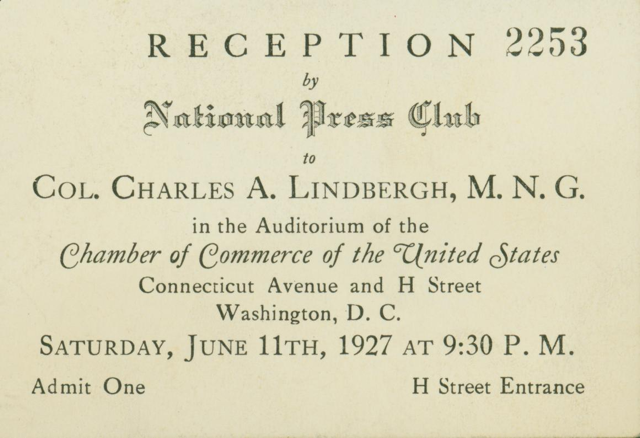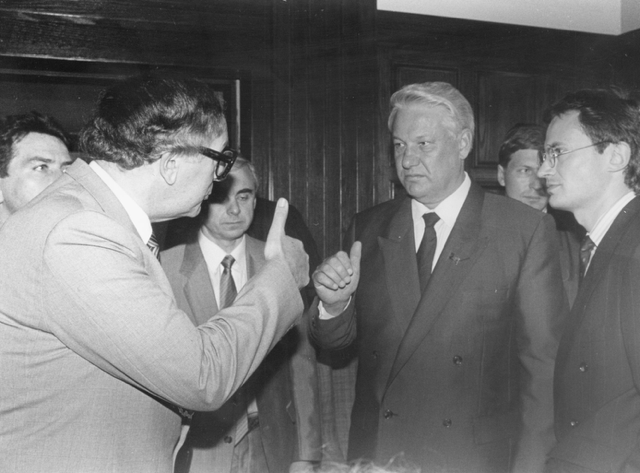This month in National Press Club history: Club hosts reception for Charles Lindbergh
Dip down anywhere in the National Press Club’s 117-year history and we find remarkable stories about events at our Club that contributed to American, world and social history. The Club’s History and Heritage Team is highlighting just a few each month so our members can appreciate the role the Club has played for more than a century as the place where news happens. Here are a few from June.
The origin of the now popular annual Spelling Bee between politicians and the press was in 1913, just a few months after President Woodrow Wilson’s inaugural. More than 1,000 people attended, including the president and most of his cabinet. The event was held at the Willard Hotel. Secretary of State William Jennings Bryan kicked it off reading a poem, “Ode to the Printing Press,” and Secretary of Agriculture David Houston read the words to the contestants. By the end of the Bee, all of the journalists had bowed out, leaving the contest between Sen. Miles Poindexter of Washington and Rep. Frank B. Willis of Ohio. Willis was declared the winner on the word hydrocephalus. But the next day, Houston found there was both a noun and an adjective form of the word, and Poindexter had also been right. The Bee was declared a tie.
June 11, 1927: Lindbergh speaks to press after arriving in the United States following historic flight

Wendell Willkie was an improbable candidate to challenge Franklin Roosevelt, who was seeking an unprecedented third term as president on the eve of America’s entry into World War II. A Wall Street corporate lawyer, who had never run for public office, Willkie was different from the other leading GOP contenders because he was not an isolationist. He did not enter any primaries, but was catching fire among the electorate through the news media. That brought him to the Club on June 12, 1940. Willkie had not planned to announce his candidacy during that speech, but as he walked into the ballroom, an advisor told him the Indianapolis News was about to reveal his plans. In the middle of the off-the-record speech, Willkie said, “Gentlemen, this is on the record, I’m going to be a candidate for president of the United States.” Reporters rushed out of the room to file the breaking story. Willkie won the nomination, but after losing the election, he worked with Roosevelt to unite the nation behind war preparations.
June 5, 1974: Woodward and Bernstein during Watergate
With the publication of their book, All the President’s Men, The Washington Post investigative duo, Bob Woodward and Carl Bernstein, addressed the Club while the final months of the Watergate investigation were playing out. They argued against pack journalism piling onto the president because it could create a backlash of sympathy for him. Right from the beginning, Bernstein said, the administration “tried to make the conduct of the press the issue, not the conduct of those we wrote about.” Watergate, they said, “was not a media conspiracy to get” Nixon.
Lothar de Maiziere, the first and only popularly elected prime minister of East Germany, spoke at the Club seven months after the Berlin Wall fell. His aim in coming to the United States was to promote the reunification of Germany. “The primary objective of our government is to make ourselves unnecessary. The more efficiently we do that, the sooner all of the wishes and aspirations of our people come true.” At the end of his address, he presented the Club with a piece of the Berlin Wall enclosed in a glass case. “We took that out when the wall came down,” he said. “In Berlin we have developed a new species of animal,” he quipped. “You know about woodpeckers. We have wallpeckers.”
 With the fall of Mikhail Gorbachev and the breakup of the Soviet Union, Boris Yeltsin was elected Russia’s first president. Fresh from victory, he electrified the Club, even though his formal address lasted only five minutes. He took question after question thrown to him by the packed audience. His interpreter struggled to keep up as Yeltsin’s answers sometimes lasted as long as several minutes. “There will be no turning back from the path Russia has chosen. I shall never be an advocate of slow half-hearted change because along that path the system will take revenge on us.”
With the fall of Mikhail Gorbachev and the breakup of the Soviet Union, Boris Yeltsin was elected Russia’s first president. Fresh from victory, he electrified the Club, even though his formal address lasted only five minutes. He took question after question thrown to him by the packed audience. His interpreter struggled to keep up as Yeltsin’s answers sometimes lasted as long as several minutes. “There will be no turning back from the path Russia has chosen. I shall never be an advocate of slow half-hearted change because along that path the system will take revenge on us.”
